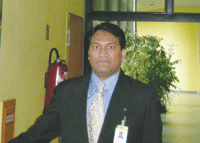 Every month shelter Don Bosco, sited in Wadala, Mumbai stages a two-day mela (festival) for the ever growing number of street children in India’s commercial capital. It is the brainchild of Dr. (Fr.) Barnabe D’Souza, an alumnus of University College, Worcester (UK) and Nirmala Niketan, Mumbai. Shelter Don Bosco is a Mumbai-based NGO which has been educating street children since 1987.
Every month shelter Don Bosco, sited in Wadala, Mumbai stages a two-day mela (festival) for the ever growing number of street children in India’s commercial capital. It is the brainchild of Dr. (Fr.) Barnabe D’Souza, an alumnus of University College, Worcester (UK) and Nirmala Niketan, Mumbai. Shelter Don Bosco is a Mumbai-based NGO which has been educating street children since 1987.
Initiated by the Salesian Society, the Shelter is part of the Don Bosco group of institutions which work with, and for youth. Fr. Barnabe worked as a teacher with Don Bosco High School, Lonavala and was vice-principal of the order’s school in Panjim, Goa, before accepting his current assignment.
In 1995 the Shelter had only three programmes — monthly melas (for medical check ups, initiation into the Shelter and recreation of street children); Outreach (a programme for identifying street children and bringing them into the Shelter), and a residential home housing 180-200 children in Wadala, central Mumbai. “The philosophy at that time was ‘let the street children be’ and infuse some happiness into their lives which were being wasted in the streets. I wanted to see them become contributing citizens of society,” says Fr. Barnabe. As director of the Shelter, he has expanded its activities to getting children off the streets and uniting them with their families.
In 1997, Shelter Don Bosco began its first non-formal classes with an enrollment of 38 boys. Last year the enrollment was 125 boys with 110 of them undergoing non-formal schooling, and the rest enrolled in municipal schools. Thus far the programme has benefited 3,500 street boys.
In 1999, Fr. Barnabe promoted Maria Ashiana, a youth drug rehabilitation programme in Lonavala near Mumbai, which runs six-month programmes for batches of 40-50 children. Together with Fr. Xavier, a previous director of the Shelter, Barnabe has conceptualised the Don Bosco Yuva Pratishthan in Karjat near Mumbai, where boys are taught life skills and trained in motor car driving and mechanics.
Over the next five years, Barnabe wants to popularise the use of FINO (financial information network and operations) cards, promoted by the Union Bank of India, among street children and the poor and homeless. “There are several social groups without identity in Indian society. With FINO, they can establish their identity by swiping a biometric hand held machine with the card and using their thumbs as the key,” he says.
The annual budget for the Shelter’s activities is around Rs.1.50 crore, and most of the funding comes from Christian missionaries in Europe. “Funds are drying up and last year the annual budget took a 90 percent dip. That’s why we have initiated Mission Shikshan to raise a corpus of Rs.1 crore through staging cultural events, to create awareness within Indian industry about Don Bosco. We won’t give up,” says this tireless samaritan.
Harshikaa Udasi (Mumbai)